From the moment you step off the plane in New Zealand, you feel the culture. The island is brimming with history from one end to the other. The influence of the Maori is easily seen so it wasn’t hard for us to decide we wanted to take a closer look at their culture.
The Tamaki Maori Village in Rotorua is the perfect place to visit if you are looking for a cultural experience and a way to understand the native people of New Zealand. From the moment you step into their office to the large feast they serve you, you will be taken into their way of life.
After spending the day in Rotorua relaxing we made our way to the Tamaki office downtown. Retrieving our tickets was a breeze and we waited in their lounge area for our bus to arrive. Unlike many commercial cultural things, the Maori village is not located in town.
Don’t leave home without: Lonely Planet New Zealand (Travel Guide)
Tamaki Maori Village Evening Experience: Everything You Need to Know
Table of Contents

Why Visit the Tamaki Maori Village?
The Tamaki Maori Village is one of the most highly rated Maori experiences in New Zealand, and it’s a must-do if you are interested in learning more about the unique culture, history and struggles of the country’s indigenous population during you stay here.
You’ll learn about Maori war practices, dances, culinary techniques and you’ll learn why many choose to tattoo themselves. Although it can seem quite touristy – and in many ways, it is of course – you have to remember that this is tradition and history, more than a representation of modern Maori life in New Zealand.
Maori descendants still make up a large proportion of the country’s population, despite centuries of colonization, and here you can learn more about them.
You’ll also be helping to preserve the unique Maori language and their cultural practices, as with the help of tourism, and renewed interest in local customs, Maori traditions have seen a huge resurgence in recent years, as they are given new outlets to express themselves.
It’s also a brilliantly fun evening, and rather than simply shuffling through a museum in Rotorua, a visit to the Tamaki Maori Village will immerse you in the culture, will have you well and truly involved in the dancing and rituals, and will leave you well-fed at the end of the evening.
Maori History in Rotorua
Rotorua is an incredibly apt location for such an immersive cultural experience, as the region has long been the center of Maori history in New Zealand. The area around Rotorua and north towards the Bay of Plenty was one of the first areas to be settled by the Maori arriving from the Polynesian Islands.
The Te Arawa and Iwi people began to make the area their home around the 14th century, and they believed themselves to be direct descendants of the Polynesians who arrived here by canoe after crossing the Pacific Ocean.
Europeans began to arrive here in the 19th century, and Rotorua and the Maori here were involved in some of the most fearsome wars that were fought between the British and the locals.
History of the Tamaki Maori Village
The Tamaki Maori Village has grown from humble roots to become one of the most well known cultural experiences in New Zealand. The company was started by two brothers, Mike and Doug Tamaki, both of Maori descent.
They worked in tourism but realized that visitors coming to New Zealand who wanted to learn more about their culture and history, were often unsure where to turn. There was no real precedent for any sort of Maori cultural experience, and local history was often overlooked.
Tourists would learn about Captain Cook, about the European colonization, and would hike through New Zealand’s beautiful landscapes without ever knowing much about the first settlers, the Maori, and the sacred nature of the very land they were tramping through and photographing.
The Tamaki brothers decided to do something about this lack of cultural experiences and in 1989, set up a Maori focused event that eventually evolved into the Tamaki Maori Village you see today. Over the years, they refined their village, they employ Maori descendants who learn as much from the company as tourists do.
They changed what was a stale, lack of understanding into Maori culture in the tourism industry, into an exciting and all-encompassing event that involves the tourists as much as the staff. The Tamaki Brothers still work on-site, so you might well see them amongst the action in the evening!
The Experience
Your experience begins on the bus ride from Rotorua, and before you even arrive you’ll have elected chieftains from amongst your group as you prepare for your first meeting at the Tamaki Maori Village.
You should know from the outset, that a visit to the Tamaki Maori Village isn’t necessarily just a show, and you won’t simply be watching the dances or listening to people talk.
It’s much, much more than this, and the whole reason this cultural performance stands out from others is that it directly involves ‘the audience’. You’ll quickly realize that you aren’t just an audience, but are very much central to the whole event.
Be prepared to get involved, to dance, to chant, to rub noses and perhaps, at first, to be a little intimidated by the warlike stance of the Maori!
The Welcome Ceremony
Maori’s were traditionally a warlike people, and you’ll see this represented still today in the infamous Hakka of the New Zealand Rugby team. You’ll be greeted by warriors, in traditional dress, who will decide whether to allow you in or to wage war!
A Powhiri, a traditional welcoming ceremony will ensure if you come in peace, and after an extravagant display, you may well be allowed into the village itself, but not before you are subjected to a loud and slightly terrifying Hacka.
The Village and the People
The village is set up in a traditional Maori style, with authentic houses, buildings, and decorations. It’s almost like being transported back in time a few hundred years, to the days of pre-European colonization.
The ‘staff’ are all Maori descendants and you’ll quickly realize their tattoos are real and they are very much involved in their culture. You’ll get to know them through traditional Maori nose greetings and fearsome rituals.
The Hangi Feast
After lots of dancing and rituals across the village, you’ll be introduced to the Hangi oven, a cooking pit that uses hot coals to slowly steam cook food.
You’ll learn about the unique culinary techniques of the Maori around Rotorua, who made use of the local vegetables, animals and even volcanic energy to produce a very much unknown style of cuisine.
Where they could, Maoris in areas of geothermal activity would use the heat and the hot coals of the volcanoes to cook their food. While you’ve been entertained and immersed in the culture, the cooks have been busy preparing an enormous feast, a feast of epic proportions.
In the Hangi oven, chicken, lamb and other meats are slow-cooked to perfection alongside a selection of traditional vegetables that would have been eaten by the chef’s ancestors.
Looking for a unique tour? You’ll enjoy this delicious, traditional food alongside salads, Maori bread, seafood and much, much more. As the evening draws to a close, you’ll be well and truly stuffed thanks to the Hangi Feast, and the night will end with a further ceremony, as you bid farewell to your new Maori friends and travel back to Rotorua.
Our Personal Experience at the Tamaki Maori Village
From the main office, you board your bus and you are whisked right into the culture with an animated bus driver of Maori heritage. He takes you on a journey through time while he gives you a thorough introduction for your evening and explains how your night will start.
We are asked to elect a chief on the bus. Our chief will represent our visiting tribe and participate in the welcoming demonstration when we arrive at the village. The driver tells us we must elect an older man that will reflect the leadership of our group.
When we arrive at the village we are told to watch carefully for the tribe warriors to exit the village into the welcoming area and challenge our chiefs. The Maori were fierce warriors and frequently put on intimidating displays to all strangers that neared their village borders.
With serious faces, we are told not to laugh or point, we watched the tradition come to life. The first warrior came from behind the trees and challenged our newly elected chief with a display of warrior moves and tactics. If this wasn’t enough to alarm you, a second warrior came out, a little more intimidating than the first.
He continued with the display of widened eyes, tongue out and loud spitting noises. The third emerged shortly later with a similar display of territory protection and placed a small fern in front of our chief.
As a token of acceptance, he bent down, grabbed the leaf and backed away slowly. This was to signal to the tribe that we were there in peace, not war. Which is a good thing, because the Maori were known to be cannibalistic when they were first encountered in New Zealand. They ate many people that tried to communicate with their tribes.
After smooth sailing through the intimidating warrior performance, we were invited into the village. We spent our time moving amongst the village and visiting the stations that were set up to educate us about the Maori way of life.
From warrior training, dance, weaving, to art, we were shown how they survived and bred their culture. I couldn’t help but notice the amazing tattoos that many of them held. The Maori people tattooed to show various achievements within their tribes.
Each tattoo depicts something that has been earned. Tattooing isn’t a recreation in this culture so it was fascinating to see some of the real tattoos the Maori descendants hold on their bodies. That said, not even the face is left out for a tattoo display.
After taking some time to visit the areas in the village we made our way into their ancestral meetinghouse where we were treated to various performances from song and dance to warrior rituals. You couldn’t help but get goosebumps as you watched their dedication to showing you the Maori culture.
The evening continued with a visit to the Hangi pits, where we were shown how they used the earth to prepare their food. Because Rotorua is a volcanic region, the Maori used this to their advantage by gathering the hot rocks, digging a hole in the earth, placing the food in the hole and then covering it with layers of thatch and hot rocks. Water was added to aid in the cooking and create steam.
Lastly, we were treated to a massive meal while being entertained by local songs.
Location of the Tamaki Maori Village
The Tamaki Maori Village is found just to the south of Rotorua, a small city set on the banks of beautiful Lake Rotorua. It’s a popular tourist destination, as the area is renowned not only for its abundance of unique Maori culture but also for its volcanic landscapes and exceptional scenery.
You can easily reach the city of Rotorua from most other destinations in the North Island, with Auckland being a three-hour bus ride away, and the main point of entry for international travelers flying into New Zealand.
Tauranga, another popular destination set on the Bay of Plenty, being just over an hour’s drive away.
The Tamaki Maori Village is actually located just to the south of Rotorua, in the rural countryside, just off State Highway 5. It’s a short car journey of just 15 kilometers to get here.
The Tamaki Maori Village has an office in Rotorua itself though, so if you are staying in the city, then you can head here first. It’s in the downtown area, by the Government Gardens, and would be difficult to miss.
As part of the package, they provide transport to the village itself, which, as you’ll soon find out, is actually all part of the experience. They will pick you up from your hotel or you can simply meet them at the office.
How to Book A Trip to the Tamaki Maori Village
You can book your tickets to the Tamaki Maori Village cultural experience at the office in Rotorua, or you can secure tickets in advance online, or through companies such as Viator.
This may be a great option if you are on a tight schedule and need to book for a particular date, as being one of the country’s most well known and popular Maori experiences, it can get booked out in peak season.
Prices start from 130 NZ for adults, which gets you transport and access to the cultural shows and displays and a huge Maori style feast at the end of the evening.
Generally, you’ll be picked up around 5:30 PM in the evening, and you’ll spend around 3 and a half hours at the village, before returning to Rotorua around 9:30 PM.
For a truly immersive experience though, you can, in fact, elect to spend the night in the Tamaki Maori Village itself. After the cultural displays and the enormous feast, you’ll be able to enjoy a Maori Spa and the Maori bar, before staying overnight.
You can book this addition through the same channels as the standard ticket, but again, there are likely to be limited beds each night!
| Recommended Tours | ||
 |  |  |
 |  |  |
| HIGHLIGHTS OF NEW ZEALAND Auckland to Christchurch 15 days Small Group 12-16 People | NEW ZEALAND–SOUTH ISLAND ENCOMPASSED Wellington to Wellington 16 days Small Group 12-16 People | NEW ZEALAND–NORTH ISLAND ENCOMPASSED Auckland to Wellington 10 Days Small Group 12-16 People |
| Check Price | Check Price | Check Price |
More on New Zealand:
- 51 Epic Things to Do in New Zealand
- 20 Awesome Things To Do In Queenstown, New Zealand
- Complete Queenstown Accommodation Guide
- 15 Fun Things to do in Tauranga, New Zealand
- Two Week New Zealand South Island Itinerary
- 19 North Island New Zealand Photos That Inspire Travel
- 25 New Zealand Photos That Showcase the South Island
- Travel Recap- 5 Weeks in New Zealand
- The Tongariro Crossing is the Best Hike in New Zealand
- Two Week North Island New Zealand Itinerary
- Kaikoura Whale Watching: The Ultimate Guide
- 21 EPIC Things To Do In Kaikoura, New Zealand
- Karangahake Gorge: Off the Beaten Track in NZ
- Piha Beach Planning & Surf Guide
- Best Time to Visit New Zealand: Month by Month Breakdown

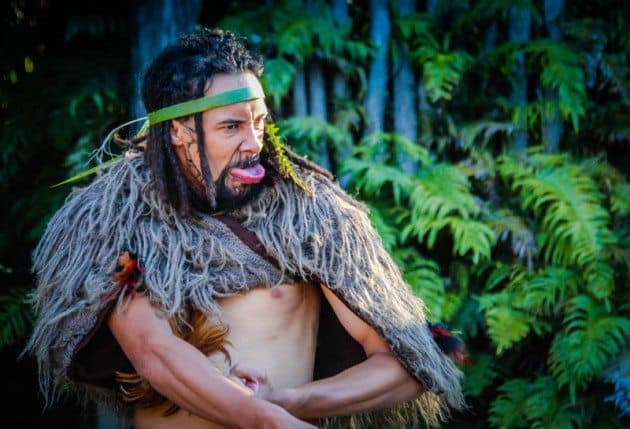
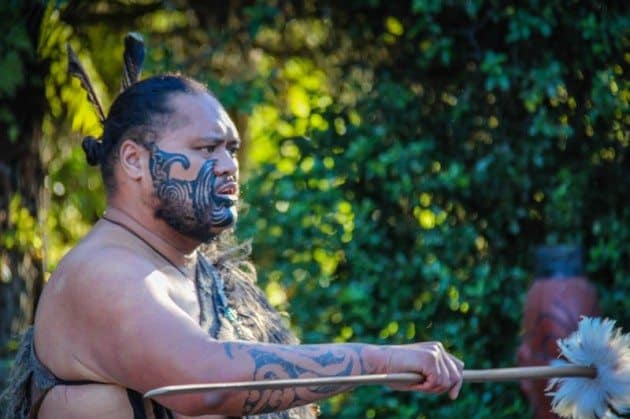
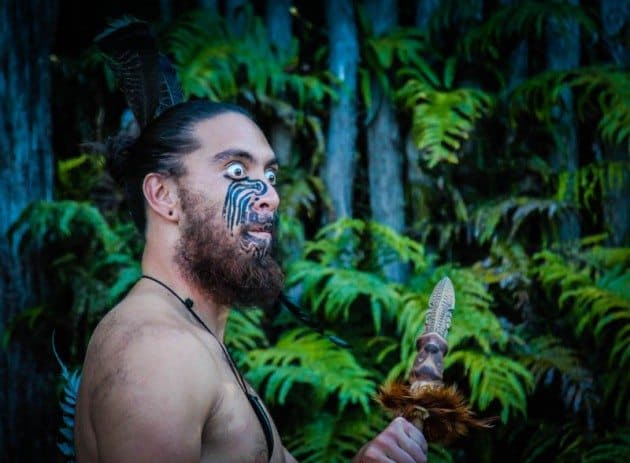
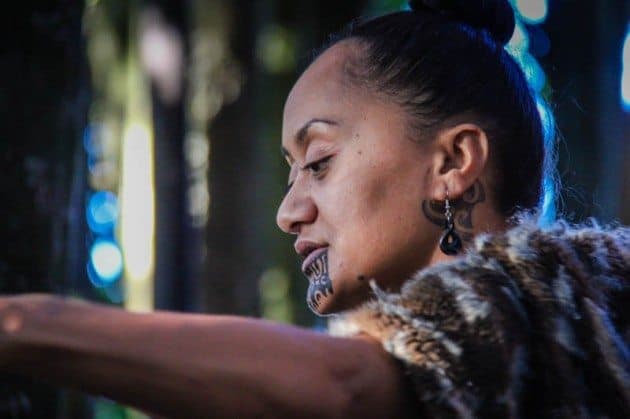

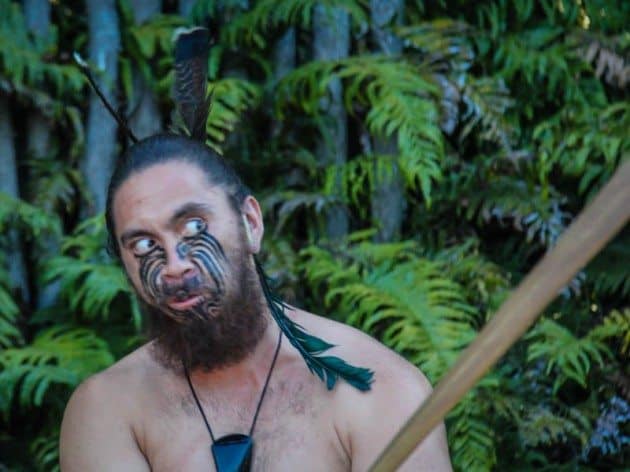
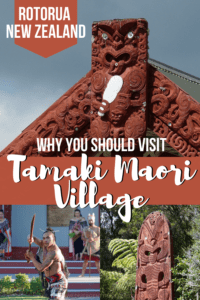

This is neat, Rotorua is my home town! I will share this post! Did you notice the smell?
We loved Rotorua! Was one of our favorite places in New Zealand. We weren’t too bothered by the smell. 🙂
Wow, what an amazing experience! I’ve tasted a Hangi feast before and it was great.
It was a very cool experience. Learning about the cultures that founded some of these incredible places is amazing. I love hearing how they used the natural resources to live and how things effected them. Very neat experience.